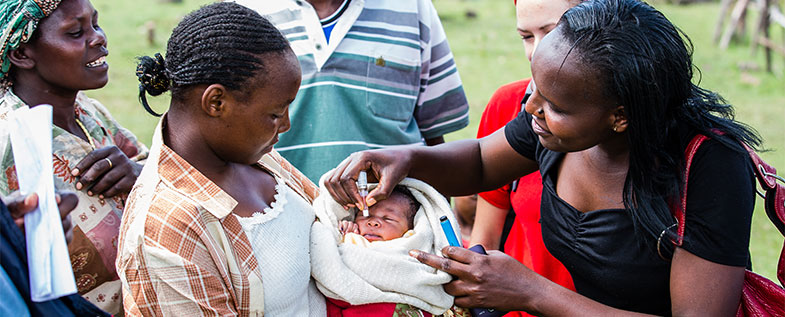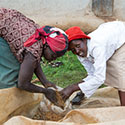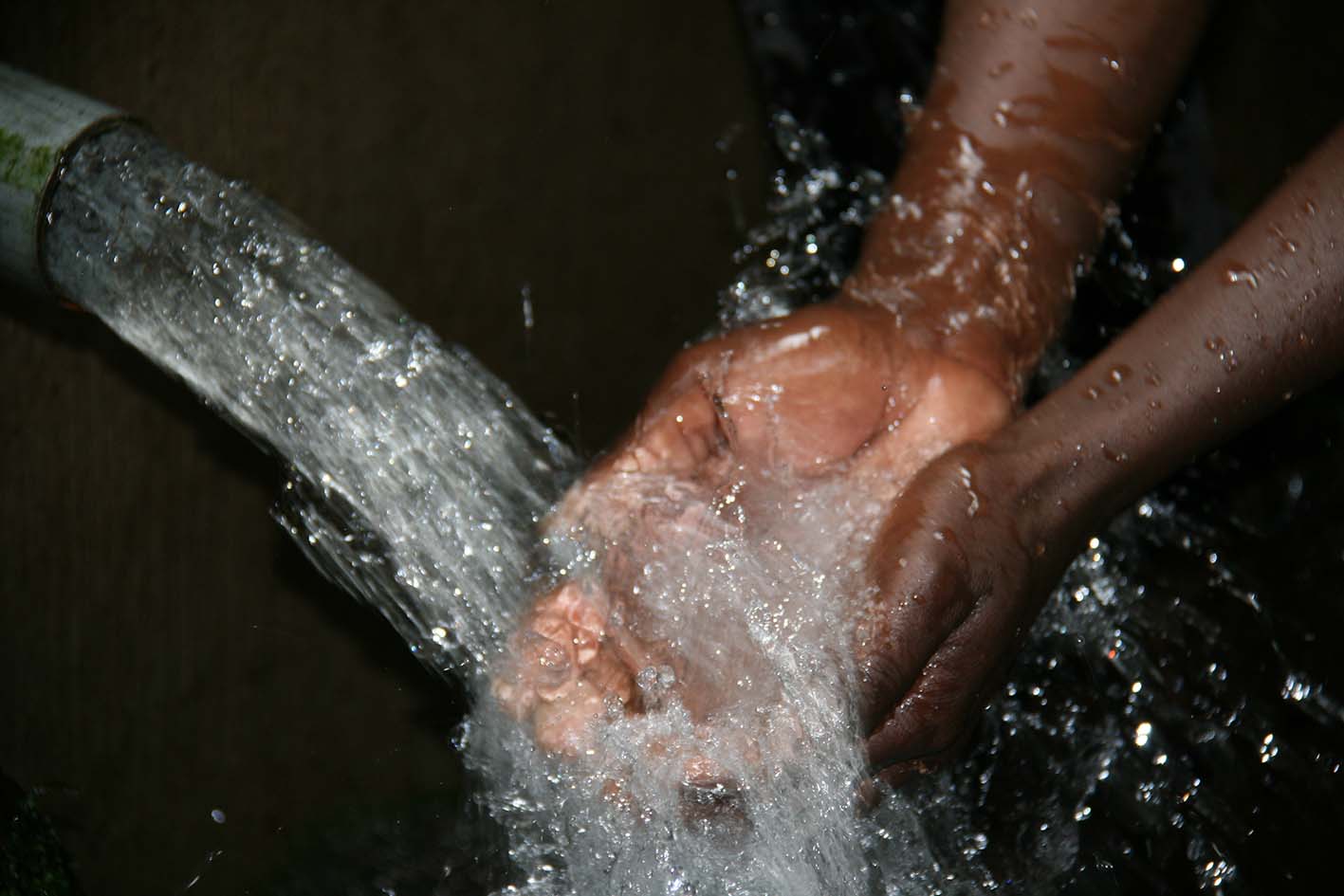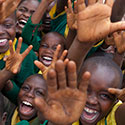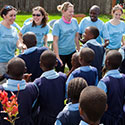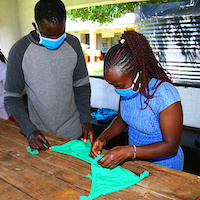Health
Of the eight UN Millennium Development Goals, three are specific to health:
- reducing child mortality
- improving maternal health
- combating HIV/AIDS, malaria and other diseases.
The Community Health Strategy is part of the Kenyan government’s work towards these aims, and we are working with the Ministry of Health in Kipkelion District – the district that includes Londiani and its surrounding villages – to make it happen.
What does that mean in practice? It means we focus on:
- mothers-to-be
- better facilities
- healthy villages and healthy homesteads
- healthy schools
- an end to female circumcision
- public health field days
- HIV/AIDS
Mothers-to-be
Sub-Saharan Africa’s very high maternal death rate is made worse by HIV/AIDS, poor water and sanitation, malaria and limited education for young girls.
We have operated programmes for healthcare professionals and community training systems for a number of years, with a strong focus on family planning, maternal health and HIV/STI prevention. But we also focus on building the skills of traditional birth attendants (TBA) and community health workers as ways to improve the community response to perinatal emergencies.
Better facilities
We are proud of the work we do in helping with medical planning and training, as well as organising courses to improve medical skills. But better skills need better facilities. That’s why the commissioning of the first-ever operating theatre at Londiani District Hospital, thanks to an Brighter Communities Worldwide partnership with Irish Aid and Mayo General Hospital in Ireland, was a particular cause for celebration.
The hospital also has a Maternal Health Shelter – supported by Brighter Communities Worldwide in partnership with Irish Aid. The purpose of this structure is to accommodate women who are due to give birth. Often the journey to hospital takes place when the woman is already in labour and this adds to the danger to both mother and baby. The shelter will eliminate this problem and if a woman needs medical assistance she is in the right place to receive it.
Healthy villages and healthy homesteads
Healthy Villages – a Kenyan Ministry of Health initiative – means villages with low rates of disease infections. Villages where community members have easy access to basic services such as clean water, good sanitation and decent food. And villages where they can expect the health care that any community needs – from immunisation and essential drugs to education and treatment for minor ailments.
And of course Healthy Villages should contain Healthy Homesteads, with reasonable space and ventilation, a smoke-free cooking environment, safe water, sanitation and rubbish disposal, food supply, healthy mums-to-be, healthy newborns and sources of income.
Planning to meet all of these aims is encouraged by the local Ministry of Health’s Community Health Strategy, boosted by village health committees and supported by key stakeholders – including us.
Smokeless stoves
We are working with the Public Health Office locally to install smokeless stoves in homesteads as an alternative to the traditional three stone fire. Most cook over open fires which are a serious health hazard as smoke inhalation causes respiratory illnesses and problems with eyes. Women and children under five years are especially at risk as they are the people who spend much of their day in the kitchen – the risk of injury through burns on open fires is also huge.
The smokeless stove design includes a chimney which extracts the smoke from the kitchen. It is also far more economical in it’s use of timber which is the main source of fuel in rural Kenya. Collection of sticks for the fire is traditionally the job of girls and women. By reducing the amount of timber required for cooking, the girls and women can spend less time collecting and more time at school or in their homes getting on with other tasks and making further improvements for their families.
Healthy schools
Over a million very young children die every year in Kenya due to lack of access to proper sanitation and safe water. Many schools in the Kipkelion District do not have adequate sanitation and hygiene facilities. Healthy Schools is trying to change that.
Our Healthy Schools Programme aims to reduce environmental risks to children’s health that arise from where they live, learn and play by providing knowledge, mobilising resources, and catalysing urgent action. The programme provides training for teachers and increases students’ awareness of environmental health issues through classroom studies.
Each school in the programme works towards ensuring that it has adequate clean water, clean latrines and hand washing facilities, a safe recreation area, no litter, safe food storage and, where needed, mosquito nets for beds. They also aim to offer ventilation in the school kitchen, a fuel-efficient stove with chimney, use of renewable energy sources and no wasting of energy or water.
Healthy children have a healthier educational outlook – but the benefits don’t stop at the school gates. A student HECA club is formed in each school which aims to spread knowledge and make it into positive action, not only in the school but also in the wider community.
And we help them to do that. We help by educating club members, providing information and resources and sponsoring the provision of materials and facilities.
Sometimes you can do a lot in a very simple way. As part of the Healthy School Programme, girl guide and girl scout leaders from around the world joined together with the Brighter Communities Worldwide to support the local community in a Girls for Girls initiative to provide local girls with sanitary products. The result? A week of missed schooling every month is now a thing of the past. Find out more.
An end to female circumcision
Female circumcision is a serious health concern – it’s a high risk activity. It’s also an abuse of human rights. Today many communities are involved in a programme to educate the community about the issue of female circumcision and run a five-day lifeskills and cultural training for girls who are at risk. The aim is to provide an option – called an Alternative Rite of Passage – for families to choose instead of female genital cutting. And the programme is led by the communities to which those families belong: local women and men prepare the course, the materials and give the trainings.
Public health field days
Education isn’t just for schools! We, in partnership with the Ministry of Health run public health field days – providing both health education and practical help. The approach to malaria, for instance, involves both education on the prevention of malaria and nets. Nutrition not only covers information about the right foods but also supplies Vitamin A. HIV/AIDS education is supported by a mobile VCT (Voluntary Counselling and Testing) unit. Mother and child health offers screening for expectant mothers and children under five years. In addition there is education on pit latrines, hand washing, rubbish disposal and dental hygiene.
HIV/AIDS
HIV/AIDs not only afflicts some two million people directly but also leaves many children orphaned or unfed. We are helping to combat this scourge, especially in rural areas where information and health services are less likely to be available than in cities.
We have run a peer education course since 2002 in Kenya; some 10,000 people have completed it. But this programme is more than just education on HIV/ AIDS; it is a life-skills development programme. The primary focus is to help participants to look at the challenges and problems of growing up, and to develop good decision-making skills – particularly when it comes to sexual and reproductive health – and to develop and sustain positive health behaviours.
…and it doesn’t stop there
Good healthcare is desperately needed by many rural communities in Kenya. We know we still have much to do – and much to offer. Working with local and central government, other organisations and – always – with the communities themselves, we hope to bring better health and longer life to the people of Londiani and its surrounding villages.

